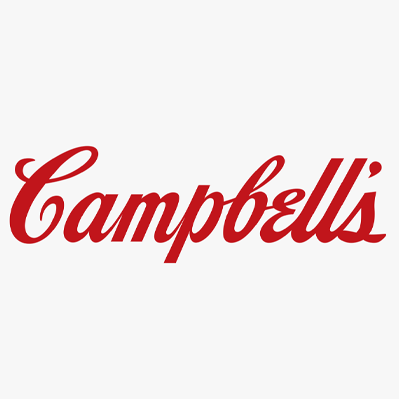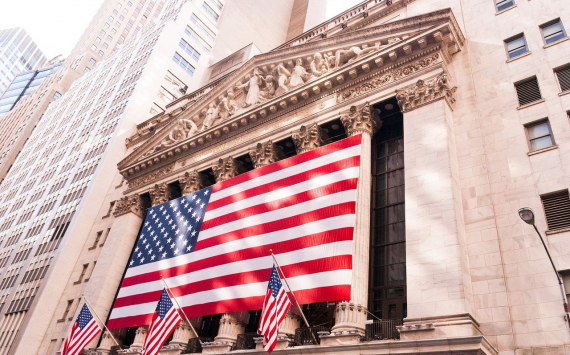Description
Campbell Soup Company is an American processed food and snack company. The company is most closely associated with its flagship canned soup products; however, through mergers and acquisitions, it has grown to become one of the largest processed food companies in the U.S. With a wide variety of products under its flagship Campbell's brand as well as other brands like Pepperidge Farm, Snyder's of Hanover, V8, and Swanson. Under its brands, Campbell's produces soups and other canned meals, baked goods, beverages, and snacks. It is headquartered in Camden, New Jersey.
The classic red-and-white can design used by many Campbell's branded products has become an American icon, and its use in pop art was typified by Andy Warhol's series of Campbell's Soup Cans prints.
History
The company was started in 1869 by Joseph A. Campbell, a fruit merchant from Bridgeton, New Jersey, and Abraham Anderson, an icebox manufacturer from South Jersey. They produced canned tomatoes, vegetables, jellies, soups, condiments, and minced meats.
In 1876, Anderson left the partnership and the company became the "Joseph A. Campbell Preserve Company". Anderson's son, Campbell Speelman, split paths with his father and continued to work at Campbell's as a creative director, originally designing the Campbell's Soup Cans.
Campbell reorganized into "Joseph Campbell & Co." in 1896. In 1897, John T. Dorrance, a nephew of the general manager Arthur Dorrance, began working for the company at a wage of $7.50 a week. Dorrance, a chemist with degrees from MIT and Göttingen University, Germany, developed a commercially viable method for condensing soup by halving the quantity of its heaviest ingredient: water. He went on to become president of the company from 1914 to 1930, eventually buying out the Campbell family.
In 1898, Herberton Williams, a Campbell's executive, convinced the company to adopt a carnelian red and bright white color scheme, because he was taken by the crisp carnelian red color of the Cornell University football team's uniforms. To this day, the layout of the can, with its red and white design and the metallic bronze medal seal from the 1900 Paris Exhibition, has changed very little, with the exception of the French phrase on the top of the bronze seal that said "Exposition-Universelle-Internationale" which was changed to the English name of the exhibition as "Paris International Exposition".
Campbell Soup became one of the largest food companies in the world under the leadership of William Beverly Murphy. He was elected executive vice president of Campbell Soup in 1949 and was president and CEO from 1953 to 1972. While at Campbell's Soup Company, he took the corporation public and increased its brand portfolio to include Pepperidge Farm's breads, cookies, and crackers, Franco-American's gravies and pastas, V8 vegetable juices, Swanson broths, and Godiva's chocolates. David Johnson was president and CEO from 1990 until 1997.
Campbell Soup has invested heavily in advertising since its inception, and many artifacts of its promotional campaigns have proven valuable in the Americana collectible advertising market. Perhaps best known are the "Campbell's Kids" designed by illustrator Grace Drayton. Ronald Reagan was a spokesman for V8 when Campbell's acquired the brand in 1948.
In addition to collectible advertising, the company has had notable commercial sponsorships. Among these was Orson Welles's The Campbell Playhouse, which had previously been The Mercury Theatre on the Air. After the program's adaptation of The War of the Worlds became a sensation for accidentally starting a mass panic due to its realism, Campbell's took over as sponsor of the radio theater program in December 1938.
The shutdown of Campbell's original plant in Camden, New Jersey, plant No. 1 was announced in 1989 with production ending the night of March 1, 1991; the plant was officially closed the following day. The plant was demolished on November 1, 1991. Plants in Pocomoke City (Maryland), Crisfield (Maryland), and Smyrna (Tennessee) also shut down.
Plant No. 2, originally a tomato-processing plant, shut down in 1980. It was responsible for about 35% of all Campbell's products in the 1950s. Products included pork and beans, tomato juice, V8 vegetable juice, Franco-American spaghetti, macaroni and cheese, and soups (notably: bean with bacon, cream of mushroom, cream of celery, and cream of asparagus.
A total of 2,800 jobs were lost, 940–1,000 of those jobs from the Camden plant. Campbell's agreed to give workers one week's payment for each year of employment as well as paying in full for six months of medical benefits, and paying half the cost for another six months. Salaried workers received one week's pay for each year of employment. Production was moved to plants in Napoleon (Ohio), Paris (Texas), and Maxton (North Carolina).
In the UK and Ireland, Campbell Soup was rebranded as Batchelors Condensed Soup (UK) and Erin (Ireland) in March 2008, when the license to use the brand name expired. Premier Foods, St. Albans, Hertfordshire bought the Campbell Soup Company in the UK and Ireland for £450 million ($830 million) in 2006, but was licensed to use the brand only until 2008. Under this agreement, the US-based Campbell Soup Company continued to produce Campbell's Condensed Soup but could not sell the product in the UK for a further five years.
Campbell's continues to be a major part of Camden, regularly participating in charity events in the community. In 2009, Campbell's completed the construction of a new and expanded headquarters in the city.
In January 2010, Campbell's Canadian subsidiary began selling a line of soups that are certified by the Islamic Society of North America as being halal (prepared in accordance with Islamic law). Although Campbell does not have any plans to sell its halal soups in the United States, the move has drawn criticism from anti-Muslim critics in the United States. Several bloggers called for a boycott of the company, but Campbell's spokesman John Faulkner stated at the time that the company did not notice any effect on its sales as a result.
In November 2007, Campbell's Soup sold Godiva to Yildiz Holding.
In July 2011, Campbell's Soup decided to once again sell its product in the UK after being absent since 2008. Symingtons began manufacturing the brand under license. The new line-up comprised twelve cup soups, five simmer soups designed to be cooked in a pot of water, four savoury rice lines, and four savory pasta and sauce packets. The new range were not sold in cans, but instead in packets and boxes. Later in 2011, the canned varieties also returned to supermarket shelves with refreshed labels and new lines.
In 2012, Campbell announced plans to buy Bolthouse Farms, a maker of juices, salad dressings and baby carrots, for $1.55 billion. Analysts saw this as an attempt to reach younger, more affluent consumers.
From 2012, Campbell Soup has been focused on updating their image and digital marketing to increase visibility among younger generations. They hired Umang Shah to lead global social and digital marketing. He led record social engagement campaigns including #DeclareRecess and #BIGFiveO.
In June 2013, Campbell acquired the Danish multinational baked goods company Kelsen Group for an undisclosed amount. Kelsen has an 85-country distribution network and is seen as providing Campbell with opportunities for international expansion, particularly into China and other Asian markets.
In June 2015, Campbell Soup acquired salsa maker Garden Fresh Gourmet for $231 million as it looked to expand into the fresh and organic packaged foods business.
In December 2017, Campbell's completed the acquisition of Pacific Foods of Oregon, LLC for $700 million and announced the agreement to acquire the snack company Snyder's-Lance for $4.87 billion in cash. The latter deal is the largest in the company's history.
The company announced in January 2018 that their only Canadian factory, in Toronto, would close. Production would shift to three existing facilities within the U.S. It was reported that the expected loss of jobs, as a result of the closing, would be 380.
Denise Morrison served as the company's president and CEO from 2011 through 2018.
On December 21, 2018, Mark Clouse, former CEO of Pinnacle Foods, was named the next Campbell's CEO, effective January 22, 2019.
Having sold over $450 million a year worth of Chunky Soup from 2004 to 2017, Campbell's asked for a trademark on "Chunky", which was approved in 2019.
In July 2019, Campbell's agreed to sell its stake in the Kelsen Group for $300 million to a subsidiary of Ferrero SpA, with the transfer to be completed in 2020. Campbell's also divested Arnott's Biscuits to KKR for $2.2 billion at the same time.
























